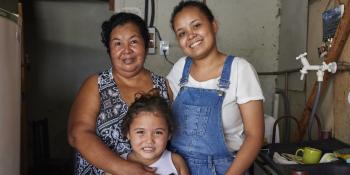At the World Urban Forum, Habitat for Humanity is showcasing five innovative models that address key global housing challenges. The models, listed below, demonstrate how housing solutions can be a powerful tool for transforming cities, tackling climate change, addressing urban crises and promoting inclusion of marginalized groups.
- Transforming informal settlements.
- Tackling climate change through adequate housing.
- Pathways to Permanence in urban crises.
- Diversifying housing tenures for affordability.
- Addressing urban inequality through targeted housing programs.
1 Transforming informal settlements
While informal settlements may offer affordability, they often lack adequacy. Through context-sensitive, cross-sectoral and people-centered interventions, we can incrementally transform informal settlements to advance affordable and adequate housing while fostering inclusive urban development and unlocking broader economic, health and educational benefits.
2 Tackling climate change through adequate housing
Upgrading the existing housing stock and repurposing underutilized urban areas is a key solution to tackling housing affordability, adequacy and sustainability. This approach optimizes land use, addresses climate vulnerability and lowers the carbon footprint, while keeping residents at the center and protecting cultural heritage.
3 “Pathways to Permanence” in urban crises
Responding to shelter needs in urban crises requires comprehensive, area-based and participatory approaches that support affected communities to transition from emergency to stability and long-term multi-dimensional development.
4 Diversifying housing tenures for affordability
Homeownership remains an aspiration for most families worldwide. However, in the face of entrenched barriers in urban land and financial markets and the dynamics of urban job markets, alternative housing tenure models based on collective land ownership, flexible and fair rental schemes, and transitional solutions that build stability are essential in meeting the housing affordability challenge.
5Addressing urban inequality through targeted housing programs
Adequate housing is essential for advancing urban and social inclusion. Sensible legal frameworks, thoughtful design features and tailored financial schemes can play a transformative role in combating systemic discrimination and ensuring no one is left behind.


